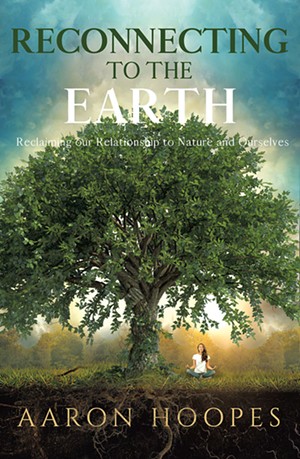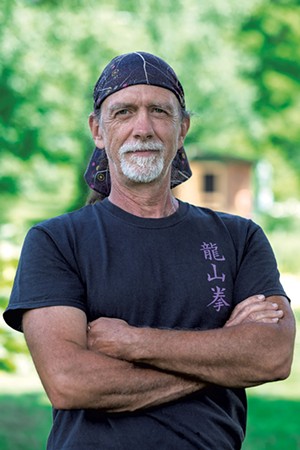
- Courtesy
- Reconnecting to the Earth: Reclaiming Our Relationship to Nature and Ourselves by Aaron Hoopes, Ozark Mountain Publishing, 112 pages. $13.
If there's a silver lining to be found in the challenges of the coronavirus pandemic, it's that Vermonters are spending more time outdoors — and finding myriad reasons to embrace nature. According to a University of Vermont Gund Institute for Environment study released on December 16, 2020, Vermonters — especially women — have significantly increased time spent on outdoor activities such as walking, gardening and wildlife watching due to COVID-19. What does this newfound appreciation for the outdoors mean for our mental, emotional and physical wellness?
Vershire author Aaron Hoopes offers one way to sum up that shift in his 2019 book Reconnecting to the Earth: Reclaiming Our Relationship to Nature and Ourselves. "If we are able to carve out some time to spend in the natural world, we give ourselves an opportunity to bring some balance back into our lives," he writes.
Hoopes, 57, has published at least five books on wellness-related topics, such as yoga, proper breathing and healthy eating. Around 2007, he developed a yoga style called Zen yoga that integrates elements of Zen meditation, tai chi and qigong.
Before he settled on the rural herbal medicine farm where his partner, Suzanne "Zanni" Lacey, runs Z Botanicals and Hemp, Hoopes spent significant time abroad studying martial arts and yoga.
"I lived in Japan for many years; I lived in Australia for many years and have tried to learn lots of different cultures and different philosophies that all work toward trying to understand the self," Hoopes told Seven Days.
Those experiences inspired and informed Reconnecting to the Earth. The short book uses quotes from thinkers such as renowned psychologists Bruce K. Alexander and Anne Wilson Schaef and from Hoopes' original poetry to explain how and why humans have strayed from nature. Among the causes Hoopes cites are the industrial revolution and the pervasiveness of electronic devices. He lays out the big-picture consequences of disconnection from nature for the individual (anxiety, depression and attention deficit problems) and for the planet (pollution, resource exploitation and the climate crisis).
The book offers guidance in the form of a program Hoopes calls the Sevens, which he developed with inspiration from his former yoga teacher Shanti Gowans and others. It consists of 49 principles for living a life more connected to the Earth. Among the recommendations are slowing down, calming the mind and nourishing the body.
Does this advice seem obvious? Sure. No one seeking a greater sense of peace and connection to the planet will be surprised by Hoopes' suggestions to put down their iPhone and embrace values of gentle kindness and generosity. Still, it can't hurt to have a list handy as a reminder when the path gets foggy.
In addition to showing that Vermonters' outdoor activity has increased during the pandemic, the UVM study reveals what it is they value about the human-nature relationship. For example, 59 percent of respondents said they cherished a greater sense of mental health and well-being outdoors. Twenty-three percent said they felt that experiences in nature were important to their sense of identity; 29 percent said they appreciated its beauty.
Hoopes agrees that connecting with the natural world takes on a new urgency during the pandemic. "Regardless of what our political beliefs are or how we've been indoctrinated by schools and corporations and news," he said, "we're all children of this Earth. If the planet dies or the planet breaks down, we're not going to survive it."
What about people who have limited access to nature? "One of the things that we can all do to help ourselves is to learn to breathe properly, and it doesn't matter whether you're indoors or outdoors or wherever," said Hoopes, who published a 2003 book on proper respiration: Breathe Smart: The Secret to Happiness, Health and Long Life. "If you can start the breathing process in a more healthy way ... that's gonna activate your parasympathetic nervous system so that you're able to relax more," he said, "[and] you're able to get your digestion working and just calm down."

- Courtesy Of Dimitry Kim
- Aaron Hoopes
When it comes to his teachings, Hoopes walks the walk, said his former yoga student Sonia Mesa. "He really lives his truths," Mesa told Seven Days from Miami, where she lives. "Ever since I've known him, he really does all the things that he says are important in the world. He backs it up by actually providing excellent examples."
To wit, Hoopes starts each day with tai chi and stretching, and he hikes or climbs every few days. Plus, "All my kung fu classes with the kids are outside now," he said, referring to his Vershire-based children's martial arts program Dragon Mountain Kung Fu. As the instructor to 16 young students, Hoopes promotes breathing, meditation, climbing and outdoor survival skills in addition to teaching martial arts.
"If we're taught as children at a young age about the value, the sacredness, the specialness of having a relationship with the natural world, then as you grow up ... [you may] want to take care of it more," he said.
To further connect kids to the Earth, the Vermont native is on the verge of launching a homeschool study course based on Reconnecting to the Earth with the remote education platform Akitsu Learning Program, founded by Mesa. Hoopes said Mesa approached him in the early days of the pandemic about adapting his book to launch a course for young people. "She just went to town creating this comprehensive seven-to-10-chapter homeschool program, and it just kind of blew me away," he recalled.
The course is geared toward students in grades three through eight and meets Common Core State Standards in language arts, science and social studies. It will include videos and live Zoom classes with Hoopes, as well as reading guidelines for instructors, field trip ideas, and a glossary of terms such as "anthropogenic" and "geosphere." Hoopes hopes a beta version of the course will be available to several families in Vermont and Florida in January and a fine-tuned version will launch widely around March.
To skeptics who might view Hoopes and his homeschool program as "woo-woo out there" (his words), Mesa said, "We're not telling anyone that this is what they need to think or feel or how they even need to approach these ideals of our surroundings. But we'd like them to have a little appetizer ... and think of it as an outline or a guideline that they can use as a stepping-stone to their own discoveries."
For adults who may be intimidated by the idea of shifting to a more nature-focused lifestyle, Hoopes said it's fine to start small. Rules and guidelines aside, "It's really about going outside and spending time in nature," he said. "You can read all the books you want about how to do it, but until you just go out there and put your bare feet on the ground and start experiencing it, it's hard to really get a feel."










Comments
Comments are closed.
From 2014-2020, Seven Days allowed readers to comment on all stories posted on our website. While we've appreciated the suggestions and insights, right now Seven Days is prioritizing our core mission — producing high-quality, responsible local journalism — over moderating online debates between readers.
To criticize, correct or praise our reporting, please send us a letter to the editor or send us a tip. We’ll check it out and report the results.
Online comments may return when we have better tech tools for managing them. Thanks for reading.